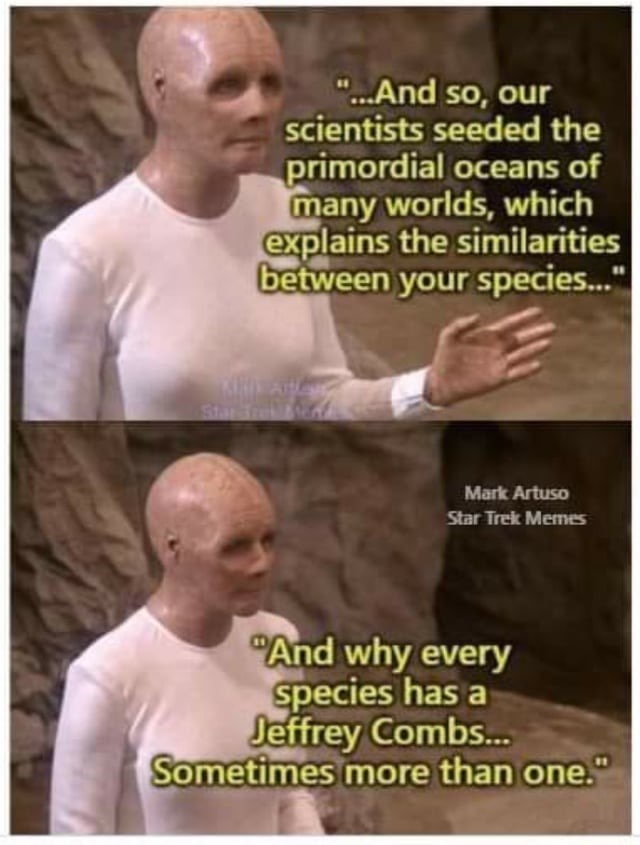this post was submitted on 04 Sep 2023
227 points (96.7% liked)
Risa
6899 readers
86 users here now
Star Trek memes and shitposts
Come on'n get your jamaharon on! There are no real rules—just don't break the weather control network.
founded 1 year ago
MODERATORS
you are viewing a single comment's thread
view the rest of the comments
view the rest of the comments

The problem is that it isn’t how evolution works at all. I think this episode and the devolution one were probably the worst, science-wise. I mean, I know they play fast and loose with everything from basic physics to computer science, but for a biologist it’s kind of the equivalent of those stories that speculate that atoms are themselves tiny solar systems with the electrons as planets that have tiny civilizations on them.
They probably came up with the idea because computers using a pseudo-random number generator can produce the same series of “random” numbers if they start from the same seed. We know that evolution is a random process. Therefore, we should imagine that we could control evolution, even over the span of billions of years, if we control the seed. 
First, we have to define our terms. When I say “evolution,” I am referring to the phenomenon that describes the change in the genetic makeup of a population over time. When we talk about evolution more colloquially, we are usually referring to (to borrow a phrase) the origin of species by means of natural selection. In other words, it is the process that explains the diversity (and homogeneity) of life from genes through ecosystems to the biosphere. It takes place simultaneously at multiple levels and the number of non-pseudo random number generators (if we want to consider them that way) is incalculable.
One of the central principles of modern theoretical biology is that you can’t rewind the evolutionary tape. The further back you rewind it, the less like our present the outcome is likely to be. Wind it back far enough - say, to the very beginning at t=0, and not only do you not get humanoids, you’re not likely to get technological intelligence. I’d be surprised to see four-limbed animals or even vertebrates. The randomness comes in not just from things like the random genetic recombination that resulted in the randomly selected gametes that resulted in the individual in a process that traces itself back through the beginning of evolutionary time. It also affects which of the resulting organisms will survive, based in part on every other living thing that’s also undergoing those same processes.
The less random part is the fitness of an organism is the contribution of its generic material to the next generation. Picture two leopards, one faster than the other due to fortunate genetics. One has a 50% chance of propagating genes to the next generation, the other 25%. If the fastest leopard is a lucky mutant, there’s still a very good chance those genes will disappear. Over time, and given some lucky rolls of the dice, we’d expect the faster gene to spread, but it can be wiped out by an unfortunate event, like breaking a leg while hunting or an unfortunate fire or flood or a mutation that gives it cancer.
Sometimes we wind up at the same place from multiple routes. Eyes evolved independently somewhere around a couple dozen times. We can use that to say that sensing light is a pretty good idea. I would not be surprised if life on other planets evolved light sensing. I would expect the underlying mathematics of evolution to be the same, modulo whatever they use for reproduction.
The field of exobiology studies how we can abstract from our single example of a biosphere and our knowledge of evolutionary dynamics and apply it to try to conceive what non-terrestrial life is like. They ask questions like “What else could take the place of DNA?” and even more importantly “What is life?”
Sorry for the rant.
The evolutionary predestination thing used to justify following the Prime Directive before it was a thing in ENT is also pretty awful.